
Human Trafficking in Maine
Human trafficking is the third largest criminal activity in the world and is a form of slavery, forced labor, domestic servitude and commercial sex trafficking.
A 2016 “Maine Human Trafficking Needs Assessment” report is a study of human trafficking in Maine and shows that hundreds of victims are of sex trafficking are reported each year. The report was produced by South Portland consultants Hornby Zeller Associates.
The report’s purpose provides a snapshot of the prevalence of human sex trafficking and exploitation across a diverse geographic and issue-related areas of Maine. They describe how sex trafficking has affected citizens and families and how law enforcement agencies should respond to trafficking and exploitation. The report covers Understanding Human Trafficking, Maine’s Human Trafficking Landscape, Prevalence of Sex Trafficking in Maine, Maine’s Response to Human Trafficking, Service Gaps and Needs, and Recommendations.
The National Human Trafficking Resource Center (NHTRC) was setup as a national anti-trafficking hotline available 24/7 at 1-888-373-7888 for victims seeking help. The NHTRC provides human trafficking victims and survivors with access to support services and tools to fight against human trafficking.
In 2000, Congress passed the Trafficking Victims Protection Act (TVPA) which was the first federal law designed to address the issue of human trafficking in the USA. Human trafficking is defined as “..labor, services or commercial sex induced through force, fraud or coercion, with all commercial sex involving minors considered human trafficking.”
According to the report, human trafficking is estimated to generate $150 billion in the U.S. annually with 20.9 million projected victims. In Maine, human trafficking does not involve foreign women being brought to large cities as occurs in many other states. Many migrant women workers, estimated around 10,000 to 12,000, often take part in the annual bluebery harvest. but this form of human trafficking in Maine goes mostly unreported. The NHTRC received 37 calls with 11 reported cases of human trafficking in 2014.
The report showed that 41 percent of reported sex trafficking cases were not foreign nationals. Another study revealed that 83 percent of sex trafficking victims in Maine were U.S. citizens.
Maine’s response to human trafficking flowchart on handling calls to the NHTRC follows this route:
- Citizen, Law Enforcement or Provider (If Under 18): Contacts the NHTRC, Child Welfare Intake, and Children’s Advocacy Center MDT
- Citizen, Law Enforcement or Provider (If Over 18): Contacts the NHTRC, Local SA/DV, and Regional Anti-Trafficking MDT
Human trafficking is a term used to describe unlawful service and forced commercial sex trafficking and forced labor. It is a federal offense, investigated by the FBI, which calls for stiff penalties for those convicted. Investigations of human trafficking are also handled by other government agencies including the Department of Justice, Department of Homeland Security and Department of Labor.
The TVPA was designed to prosecute federally those who carry out human trafficking crimes. Persons convicted of human trafficking may face multiple years in prison and if a minor was involved the penalties may be increased. There are no statute of limitations on human trafficking offenses making it possible for charges to be brought at any time after the offense has taken place.
Promoting Prostitution in Maine
According to the Maine Revised Statutes Title 17-A of the Maine Criminal Code, “promotes prostitution” is defined as:
- A. Causing or aiding another to commit or engage in prostitution, other than as a patron; [1995, c. 638, §3 (AMD).]
- B. Publicly soliciting patrons for prostitution. Publicly soliciting patrons for prostitution includes, but is not limited to, an offer, made in a public place, to engage in a sexual act or sexual contact, as those terms are defined in section 251, in return for a pecuniary benefit to be received by the person making the offer or a 3rd person; [1995, c. 638, §3 (AMD).]
- C. Providing persons for purposes of prostitution; [1995, c. 638, §3 (AMD).]
- D. Leasing or otherwise permitting a place controlled by the defendant, alone or in association with others, to be regularly used for prostitution; [1995, c. 638, §3 (AMD).]
- E. Owning, controlling, managing, supervising or otherwise operating, in association with others, a house of prostitution or a prostitution business; [1995, c. 638, §3 (AMD).]
- F. Transporting a person into or within the State with the intent that such other person engage in prostitution; or [1975, c. 499, §1 (NEW).]
- G. Accepting or receiving, or agreeing to accept or receive, a pecuniary benefit pursuant to an agreement or understanding with any person, other than with a patron, whereby the person participates or the person is to participate in the proceeds of prostitution. [1995, c. 638, §3 (AMD).]
Promotion of prostitution is a Class D misdemeanor punishable by $2,000 in fines and up to 364 days in jail. If the victim is a minor, the charges are elevated to a Class B Felony with up to $20,000 in fines and up to 10 years in prison.
Charged With Human Trafficking or Promotion of Prostitution?
If you are under investigation for or charged with a federal human trafficking crime or promoting prostitution in Maine, contact Richard S. Berne today at 207-871-7770. Richard is an experienced advocate for persons charged with federal and state crimes throughout Maine.
